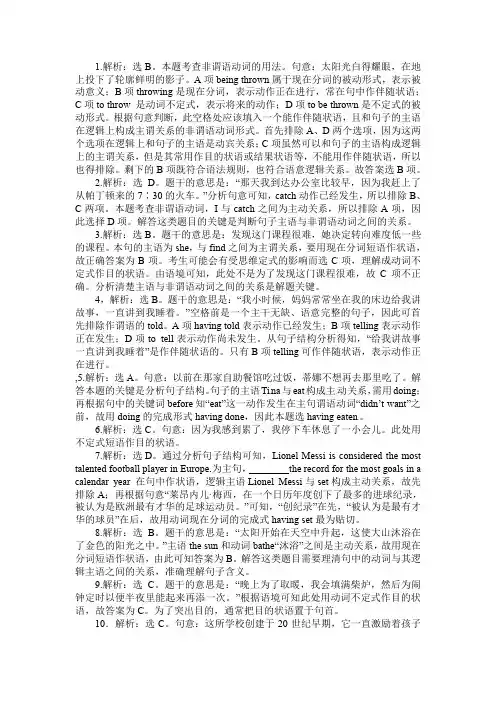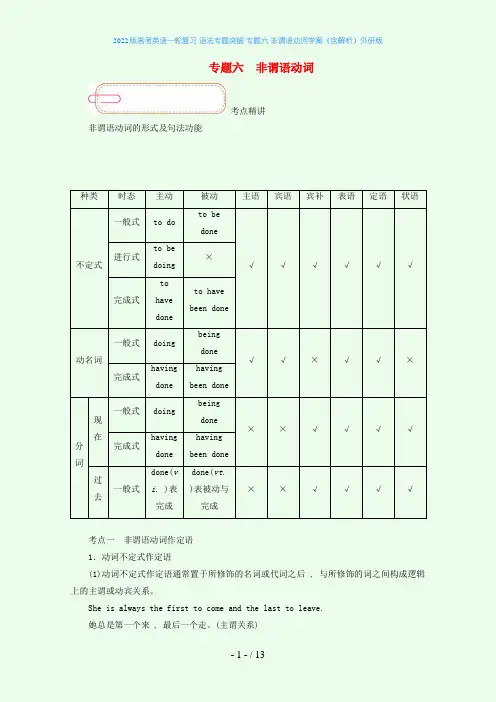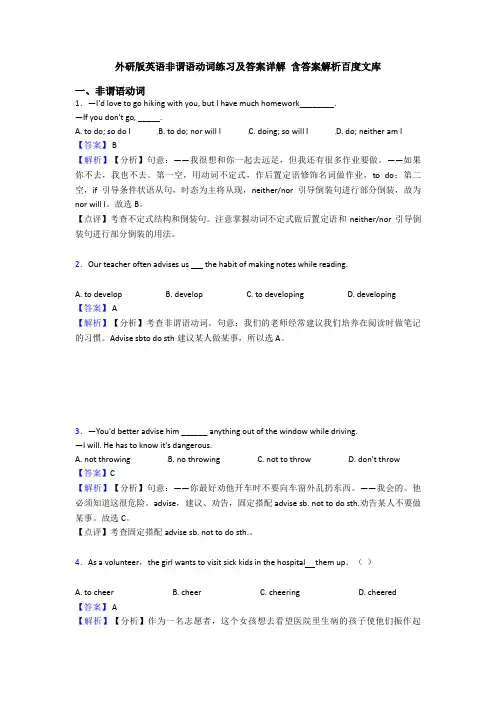非谓语动词学案+答案
- 格式:doc
- 大小:133.00 KB
- 文档页数:14

1.解析:选B。
本题考查非谓语动词的用法。
句意:太阳光白得耀眼,在地上投下了轮廓鲜明的影子。
A项being thrown属于现在分词的被动形式,表示被动意义;B项throwing是现在分词,表示动作正在进行,常在句中作伴随状语;C项to throw 是动词不定式,表示将来的动作;D项to be thrown是不定式的被动形式。
根据句意判断,此空格处应该填入一个能作伴随状语,且和句子的主语在逻辑上构成主谓关系的非谓语动词形式。
首先排除A、D两个选项,因为这两个选项在逻辑上和句子的主语是动宾关系;C项虽然可以和句子的主语构成逻辑上的主谓关系,但是其常用作目的状语或结果状语等,不能用作伴随状语,所以也得排除。
剩下的B项既符合语法规则,也符合语意逻辑关系。
故答案选B项。
2.解析:选D。
题干的意思是:“那天我到达办公室比较早,因为我赶上了从帕丁顿来的7∶30的火车。
”分析句意可知,catch动作已经发生,所以排除B、C两项。
本题考查非谓语动词,I与catch之间为主动关系,所以排除A项,因此选择D项。
解答这类题目的关键是判断句子主语与非谓语动词之间的关系。
3.解析:选B。
题干的意思是:发现这门课程很难,她决定转向难度低一些的课程。
本句的主语为she,与find之间为主谓关系,要用现在分词短语作状语,故正确答案为B项。
考生可能会有受思维定式的影响而选C项,理解成动词不定式作目的状语。
由语境可知,此处不是为了发现这门课程很难,故C项不正确。
分析清楚主语与非谓语动词之间的关系是解题关键。
4,解析:选B。
题干的意思是:“我小时候,妈妈常常坐在我的床边给我讲故事,一直讲到我睡着。
”空格前是一个主干无缺、语意完整的句子,因此可首先排除作谓语的told。
A项having told表示动作已经发生;B项telling表示动作正在发生;D项to tell表示动作尚未发生。
从句子结构分析得知,“给我讲故事一直讲到我睡着”是作伴随状语的。

2019高考英语:(15)二轮语法学案(非谓语动词)(练习题配解析或解析)本单元复习非谓语动词形式,即动词不定式、动名词和分词(一)不定式不定式的用法(1)作主语。
不定式短语作主语时,往往放在谓语之后,用it作形式主语。
eg:ToseeistobelievE、眼见为实。
Itisrighttogiveupsmoking、戒烟是正确的。
(2)作宾语。
不定式短语作宾语时,如果还带有宾语补足语,往往把不定式放在宾语补足语之后,而用it作形式宾语。
eg:Hewantedtogo、他想去。
IfinditinterestingtostudyEnglish、我发现学英语是有趣的。
(3)作宾语补足语eg:Heaskedmetoworkwithhim、他要我和他一起工作。
(4)作定语eg:IvegotalettertowritE、我有一封信要写。
Heneedsaroomtolivein、他需要一间房子住。
(5)作状语,表示目的、原因、结果或条件。
eg:Icameheretoseeyou、我来这儿是为了看你。
(目的)目的状语还可以用inorderto或soasto来表示。
eg:Weturnedthelightsoffinordernottowasteelectricity、为了不浪费电,我们把灯关了。
Checkyourcompositionsoastoavoidmistakes、检查你的作文以避免犯错。
Tolookathim,youwouldlikehim、看着他,你将会喜欢他。
(条件) Wewereveryexcitedtohearthenews、听到这个消息,我们感到非常兴奋。
(原因) HehurriedtotheschooltofindnobodytherE、他匆忙赶到学校。
发现那里没有人。
(结果)(6)作表语eg:Myjobistohelpthepatient、我的工作是帮助病人。
(二)动名词1、动名词形式由“动词-ing"构成,具有动词和名词的性质。

外研版英语非谓语动词总结和练习含答案解析百度文库一、非谓语动词1.——Does your aunt only have a piece of bread for supper? ——Yes. She eats a little . She looks slimmer than before.A. to save moneyB. to lose weightC. saving moneyD. losing weight【答案】B【解析】【分析】句意:一一你姨晚餐只吃一块面包?一一是的,为了减肥,她只吃一点。
她看上去比以前苗条了。
A.省钱;B.减肥;C.省钱;D.减肥。
根据语境可以推测出吃得少的目的是为了减肥。
A、C错。
用不定式作目的状语,故选B。
2.Our teacher often advises us the habit of making notes while reading.A. to developB. developC. to developingD. developing【答案】 A【解析】【分析】考查非谓语动词。
句意:我们的老师经常建议我们培养在阅读时做笔记的习惯。
Advise sbto do sth建议某人做某事,所以选A。
3.We set up this group disabled people like Ben Smith.A. helpB. to helpC. helping【答案】 B【解析】【分析】句意:我们成立这个小组是为了帮助像Ben Smith这样的残疾人。
建立小组是帮助人的目的,此处不定式to help表目的,作目的状语,故选B。
【点评】考查动词不定式做目的状语。
4.Our teacher often tells us in the river. It's dangerous.A. not swimB. not to swimC. to swimD. swimming 【答案】 B【解析】【分析】句意:游泳是危险的。

外研版英语非谓语动词含答案解析百度文库一、非谓语动词1.Bruce practices basketball every day so that he can be a better player.A. playB. to playC. playing【答案】 C【解析】【分析】考查非谓语动词的用法。
句意:Bruce每天练习打篮球以便他能成为一位更好的运动员。
practice + doing sth练习做某事。
故选C。
2.Our teacher often advises us the habit of making notes while reading.A. to developB. developC. to developingD. developing【答案】 A【解析】【分析】考查非谓语动词。
句意:我们的老师经常建议我们培养在阅读时做笔记的习惯。
Advise sbto do sth建议某人做某事,所以选A。
3.Attention, please! Without permission, children are not allowed alone here.A. to swimB. swimmingC. swimD. swam【答案】 A【解析】【分析】句意:请注意!未经允许,孩子们不能单独在这里游泳。
swim代词,游泳;to swim不定式形式;swam过去式。
固定搭配allow sb. to do sth.允许某人做某事,动词不定式作宾补;本句为此结构的被动形式be allowed to do sth被允许做某事。
故选A。
【点评】此题考查固定短语be allowed to do。
4.—You'd better advise him ______ anything out of the window while driving.—I will. He has to know it's dangerous.A. not throwingB. no throwingC. not to throwD. don't throw【答案】C【解析】【分析】句意:——你最好劝他开车时不要向车窗外乱扔东西。

人教版英语非谓语动词练习及答案详解含答案解析百度文库一、非谓语动词1.Bruce practices basketball every day so that he can be a better player.A. playB. to playC. playing【答案】 C【解析】【分析】考查非谓语动词的用法。
句意:Bruce每天练习打篮球以便他能成为一位更好的运动员。
practice + doing sth练习做某事。
故选C。
2.We advise parents _____ their children at home alone in order to keep them away from danger.A. not leaveB. not to leaveC. leaveD. to leave【答案】 B【解析】【分析】句意:为了使孩子远离危险,我们建议父母不要单独把孩子留在家里。
advise sb to do sth建议某人做某事,动词不定式的否定形式就是在to前面加not故advise sb not to do sth建议某人不要做某事。
结合句意,故选B3.Taiji is my favorite and I often play it healthy.A. to keepB. keepsC. keepingD. kept【答案】 A【解析】【分析】句意:太极拳是我是最爱,为了保持我经常打太极拳。
这里考查的是非谓语动词,用动词不定式来表示目的。
故选A。
考点:考查非谓语动词的用法。
4.We have worked so long. Shall we stop a rest?A. haveB. to havingC. havingD. to have【答案】 D【解析】【分析】考查非谓语动词。
句意:我们已经工作了很长时间。
我们停下来休息休息吗?stop doing sth停止做某事;stop to do sth停下来去做某事。

专题六非谓语动词考点精讲非谓语动词的形式及句法功能种类时态主动被动主语宾语宾补表语定语状语不定式一般式to doto bedone√√√√√√进行式to bedoing×完成式tohavedoneto havebeen done动名词一般式doingbeingdone√√×√√×完成式havingdonehavingbeen done分词现在一般式doingbeingdone××√√√√完成式havingdonehavingbeen done过去一般式done(vi. )表完成done(vt.)表被动与完成××√√√√考点一非谓语动词作定语1.动词不定式作定语(1)动词不定式作定语通常置于所修饰的名词或代词之后 , 与所修饰的词之间构成逻辑上的主谓或动宾关系。
She is always the first to come and the last to leave.她总是第一个来 , 最后一个走。
(主谓关系)Have you got a letter to write?你有信要写吗?(动宾关系)特别提示 : 动词不定式既可用主动式也可用被动式 , 但其含义有所不同。
试比拟 : Do you have anything to send? (动作的执行者是〞你〞)你还邮寄什么东西吗?Do you have anything to be sent ?(动作的执行者是〞我〞或〞别人〞)你还有什么东西要(我或别人)去寄吗?(2)当名词或代词被序数词、形容词最高级、the last、the only等修饰 , 且不定式与其逻辑主语为主谓关系时 , 常用动词不定式作定语。
He is the best man to do the job.他是做这项工作的最正确人选。
(3)当被修饰词是表示抽象意义的名词时 , 常用不定式作后置定语 , 且不定式常用主动形式。

外研版英语非谓语动词练习及答案百度文库一、非谓语动词1.Bruce practices basketball every day so that he can be a better player.A. playB. to playC. playing【答案】 C【解析】【分析】考查非谓语动词的用法。
句意:Bruce每天练习打篮球以便他能成为一位更好的运动员。
practice + doing sth练习做某事。
故选C。
2.We advise parents _____ their children at home alone in order to keep them away from danger.A. not leaveB. not to leaveC. leaveD. to leave【答案】 B【解析】【分析】句意:为了使孩子远离危险,我们建议父母不要单独把孩子留在家里。
advise sb to do sth建议某人做某事,动词不定式的否定形式就是在to前面加not故advise sb not to do sth建议某人不要做某事。
结合句意,故选B3.Would you mind ____________down the music? It's too noisy.A. to turnB. turningC. turn【答案】 B【解析】【分析】句意:你介意把音乐的音量调小一些吗?太吵了。
A. to turn 不定式 B. turning 动名词(或现在分词) C. turn.动词原形。
mind.意为"介意;在乎"后面只能跟动名词作宾语,故答案选B。
【点评】考查动名词的用法,掌握固定搭配。
4.—You'd better advise him ______ anything out of the window while driving.—I will. He has to know it's dangerous.A. not throwingB. no throwingC. not to throwD. don't throw【答案】C【解析】【分析】句意:——你最好劝他开车时不要向车窗外乱扔东西。

非谓语动词讲解及练习( 含答案 )一、单项选择非谓语动词1.What will you do if the people ______ at the back of the hall have trouble hearing the speech? A. sitting B.sitC. sat D. to sit【答案】 A【解析】考查非谓语动词。
句意:如果坐在大厅后排的人们听不清演讲你该怎么办?根据题干中谓语动词have trouble doing 判断出前面填非谓语结构,“人们”和“坐”是主动关系,故选 A。
2.In Australia, many road signs are now both in English and Chinese, ______ it easier for Chinese tourists to travel.A. making B. made C. make D.makes【答案】 A【解析】考查状语从句。
在澳大利亚,许多路标都是用英文和中文同时标识,使中国游客去旅游更加容易。
根据与前面一句用逗号隔开,没有连词,故判断此空用非谓语动词,根据与主语是主动关系,故用动词-ing 形式,用来修饰和补充上一句话,故选A。
3.For breakfast he only drinks juice from fresh fruit________on his own farm.A. grown B.being grownC. to ge grown D. to grow【答案】 A【解析】【详解】考查非谓语动词作定语。
句意:早餐,他只喝来自他自己农场种植的新鲜水果的果汁。
grow 作定语修饰fruit , grow 与 fruit 之间为逻辑上的动宾关系,是被动关系,故用过去分词作定语。
B 项表示正在进行; C 项表示还未发生,均不符合题意。
故选A。
4.The children talked so loudly at dinner table that I had to struggle ________.A. to be heard B.to have heardC. hearing D. being heard【答案】 A【解析】【详解】考查不定式的被动语态形式。

(完整版word)非谓语动词复习附答案一、非谓语动词1.I remember ______ to Beijing when I was a child.A. to takeB. takingC. to be takenD. being taken【答案】 D【解析】【分析】句意:我记得小时候被带到过北京的。
Remember to do sth记得要做某事(事情未做);remember doing sth记得做过某事(事情已做)。
小时候被带到北京去过,事情已做,用remember doing,A、C错。
记得我被带到,用被动语态,故选D。
【点评】本题考查非谓语动词,注意被动语态的结构是be动词+过去分词。
2.—I think the environment is terrible these years.—Yes, it will be even worse the government takes action it.A. until; protectB. unless; to protectC. if; protecting【答案】 B【解析】【分析】句意:——我认为这几年来环境太糟糕了。
——是的,环境会变得更糟糕,除非政府采取措施保护环境。
A. until; 直到…为止,B. unless除非,如果不,连词;C. if 如果,连词;until和if放在这里,句意不通顺,take action to do sth. 采取行动去做某事,动词不定式作目的状语,故选B。
【点评】此题考查连词短语和固定搭配。
3. You should ask Bob ________ his own clothes. He is ten years old now.A. washB. washesC. washingD. to wash【答案】 D【解析】【分析】考查非谓语动词。
句意:你应该要求鲍勃洗自己的衣服。
他现在已经十岁了。

外研版英语非谓语动词练习及答案详解含答案解析百度文库一、非谓语动词1.—I'd love to go hiking with you, but I have much homework________.—If you don't go, _____.A. to do; so do IB. to do; nor will IC. doing; so will ID. do; neither am I【答案】 B【解析】【分析】句意:——我很想和你一起去远足,但我还有很多作业要做。
——如果你不去,我也不去。
第一空,用动词不定式,作后置定语修饰名词做作业,to do;第二空,if 引导条件状语从句,时态为主将从现,neither/nor引导倒装句进行部分倒装,故为nor will I。
故选B。
【点评】考查不定式结构和倒装句。
注意掌握动词不定式做后置定语和neither/nor引导倒装句进行部分倒装的用法。
2.Our teacher often advises us the habit of making notes while reading.A. to developB. developC. to developingD. developing【答案】 A【解析】【分析】考查非谓语动词。
句意:我们的老师经常建议我们培养在阅读时做笔记的习惯。
Advise sbto do sth建议某人做某事,所以选A。
3.—You'd better advise him ______ anything out of the window while driving.—I will. He has to know it's dangerous.A. not throwingB. no throwingC. not to throwD. don't throw【答案】C【解析】【分析】句意:——你最好劝他开车时不要向车窗外乱扔东西。

(完整版word)非谓语动词练习及答案一、非谓语动词1.Running ______ a good way to exercise every day.A. isB. wasC. areD. were【答案】A【解析】【分析】句意:每天跑步是一种锻炼的好方式。
“跑步”作句子的主语,动词短语作主语,用成动名词形式;动名词作主语时,谓语用第三人称单数形式。
故选A。
【点评】本题考查主谓一致。
以及is was ,are,were四个词的意义和用法。
2.—I think the environment is terrible these years.—Yes, it will be even worse the government takes action it.A. until; protectB. unless; to protectC. if; protecting【答案】 B【解析】【分析】句意:——我认为这几年来环境太糟糕了。
——是的,环境会变得更糟糕,除非政府采取措施保护环境。
A. until; 直到…为止,B. unless除非,如果不,连词;C. if 如果,连词;until和if放在这里,句意不通顺,take action to do sth. 采取行动去做某事,动词不定式作目的状语,故选B。
【点评】此题考查连词短语和固定搭配。
3.Would you mind ____________down the music? It's too noisy.A. to turnB. turningC. turn【答案】 B【解析】【分析】句意:你介意把音乐的音量调小一些吗?太吵了。
A. to turn 不定式 B. turning 动名词(或现在分词) C. turn.动词原形。
mind.意为"介意;在乎"后面只能跟动名词作宾语,故答案选B。
【点评】考查动名词的用法,掌握固定搭配。
语法复习专题七——非谓语动词一、 非谓语动词的分类二、 非谓语动词的语法功能及时态、语态三、非谓语动词的使用条件一个句子当中,已经存在一个主句(谓语动词), 又没有连词的情况下, 还有别v-ed 过去分词 词的动词出现时,这些动词就充当了非谓语动词。
Ex. 1: 找出下列句子中的非谓语动词(含短语)。
1. Tom returned from the manager’s office, telling me that the boss wanted to see me at once.2. The news meeting, to be held in that hall, has already been crowded with reporters.3. I heard the girl singing in the classroom.4. The man talking with my father is Mr. Wang.5. To live is to struggle. (生活就是斗争。
)四、非谓语动词的用法★非谓语三种基本形式表达的意义•Seeing from the top of the hill, we find the park is beautiful. 主动,进行•Please keep quiet in the reading room. 性质•Founded in 1636, Harvard is one of the most famous universities in the US. 被动,完成•We see fallen leaves on the ground. 完成•Dressed in red, she looks more beautiful. 状态•We are invited to a party to be held next Friday. 将来•We plant many trees to make our city green. 目的表达意义:动词-ing :主动, 进行, 性质;动词-ed :被动, 完成, 状态;to do:将来, 目的。
1、v-ing作非谓语动词(1)作主语Eg: Seeing is believing. Sending e-mail is increasingly popular. Ex. 2: 请用v-ing作主语,把以下句子翻译成英文。
1)说太多会给你带来麻烦。
_____________________________________________________________________2) 散步对老年人和年轻人来说都是一种好的运动形式。
_____________________________________________________________________(2)作宾语Eg: I couldn’t help crying when I heard the bad news.★mind, suggest, delay, keep on, look forward to, enjoy, appreciate, imagine, practice, finish, succeed in, consider, can’t help, miss等动词用v-ing 作宾语。
★在表示“需要” 的need, want和require等后用v-ing形式的主动形式表示被动意义, 也可用不定式的被动式。
Eg: This car needs repairing. Or: This car needs to be repaired. Ex. 3: 请把以下句子翻译成英文。
1)你介意独处吗?________________________________________________________ 2)他没有马上把消息告诉她。
_____________________________________________________________________3)这种食物要煮过才能吃。
_____________________________________________________________________(3)作表语Eg: The story is so moving. The book is very interesting.Ex. 4: 请把以下句子翻译成英文。
1)这个问题真的很令人困惑。
______________________________________________________________________2)他的话很让人失望。
______________________________________________________________________(4)作定语Eg: China is a developing country.The kite flying in the sky was made by him.★位置:1)单个的动词的-ing形式做定语,常放在被修饰词前做前置定语。
如:a flying object2)动词的-ing形式的短语做定语,常放在被修饰词后做后置定语。
如:an object flying in the air★如果-ing形式与被修饰词是被动关系,就用它的被动式,即being done, 通常表示正在被做,常做后置定语。
如:the tall building being built now 正在被建的高楼Ex. 5: 请用v-ing作定语,把以下句子翻译成英文。
1)这片正被破坏的森林曾经是很迷人的。
_____________________________________________________________________2) 在一中学习的学生数量大约为8000人。
_____________________________________________________________________3) 这是一部让人感动的电影。
_____________________________________________________________________(5)v-ing作状语1) v-ing短语在句子中作状语,可以表示时间、原因、结果、条件、方式或伴随动作等。
★表时间Eg: Turning around, she saw a police car driving up.Looking out of the window, I saw some children playing football.(When) hearing the news, he couldn’t help laughing.★表原因Eg: Being poor, he couldn’t go to school.Seeing nobody at home, he left them a note.Not knowing his telephone number, I couldn’t get in touch with him.★表方式或伴随Eg: She stood, waiting for a bus.He sat there, reading a book.The students ran out of the classroom, talking and laughing.★表结果Eg: The child slipped and fell, hitting his head against the door.Her husband died, leaving her four children.They fired, killing many people in the street.★表条件Eg: Using your head, yo u’ll find a good way.Working hard, you’ll surely succeed.2)当v-ing形式所表示的动作发生在谓语动词动作之前时,应使用完成式:having doneEg: Having finished his homework, he rushed out to play basketball.Ex. 6: 用所给词的适当形式填空。
1) ____________ (not know) much French, they couldn’t make th emselves understood when they were in Paris.2) ________________ (finish) all work, they went home.3) Sarah pretended to be cheerful, _____ (say) nothing about the argument.4) ___________ (gather) around the fire, the tourists danced with the local people.5) _______ (look) at my classmates’ faces, I read the same excitement in their eyes.6) It rained heavily in the south, _____ (cause) serious flooding in several provinces.(6)v-ing作宾补★have, leave, keep, see, watch, hear, find, notice, feel, catch等动词及with介词后可用v-ing形式作宾补。
Eg: Can you hear a girl singing an English song in the next room now?With his mother helping him, he is getting on well with his work.2、v-ed作非谓语动词(1) 作表语Eg: We were so bored that we couldn’t help yawning.She felt confused, and even frightened.Ex. 7: 用括号内的词的适当形式填空。
1) I’m _______________ (satisfy) with your answer.2) He is not___________________ (interest) in research.(2) 作定语Eg: She has a pleased look on her face.The teacher gave us a satisfied smile.cooked food 熟食;成品 a written report 书面报告;报告书fried eggs煎鸡蛋;炒蛋 boiled water 开水;白开水frozen food 速冻食品 armed forces武装部队;武装力量required courses 必修课 fallen leaves 落叶finished products 成品 a forced smile 苦笑Ex. 8: 用括号内词的适当形式填空。